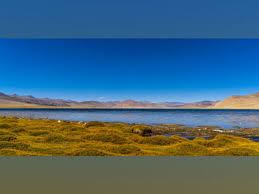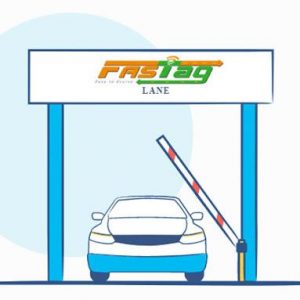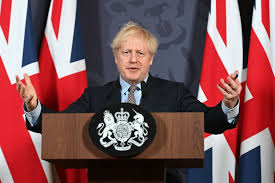Daily Current Affairs for Government Exams:
Today Current Affairs: 25th December 2020 for UPSC IAS exams, State PSC exams, SSC CGL, State SSC, RRB, Railways, Banking Exam & IBPS, etc
Table of Contents
Contents:
- Tso Kar Wetland Complex
- FASTag:
- Public interest litigation filed by a five-month-old infant:
- Post- Brexit deal::
- CoWIN:
- Good Governance Day
- other important current affairs
1.Tso Kar Wetland Complex:

India has added Tso Kar Wetland Complex in Ladakh as its 42nd Ramsar site, which is a second one in the Union Territory (UT) of Ladakh.
- The Tso Kar Basin is a high-altitude wetland complex, consisting of two principal waterbodies, Startsapuk Tso, a freshwater lake of about 438 hectares to the south, and Tso Kar itself, a hypersaline lake of 1800 hectares to the north, situated in the Changthang region of Ladakh, India.
- It is called Tso Kar, meaning white lake, because of the white salt efflorescence found on the margins due to the evaporation of highly saline water.
- The Tso Kar Basin is an A1 Category Important Bird Area (IBA) as per Bird Life International and a key staging site in the Central Asian Flyway.
- The site is also one of the most important breeding areas of the Black-necked Crane (Grus nigricollis) in India.
- This IBA is also the major breeding area for Great Crested Grebe (Podicepscristatus), Bar-headed Geese (Anserindicus), Ruddy Shelduck (Tadornaferruginea), Brown-headed Gull (Larusbrunnicephalus), Lesser Sand-Plover (Charadriusmongolus) and many other species.
- Tso Moriri or Lake Moriri or “Mountain Lake”, is a lake in the Changthang Plateau in Ladakh. It was notified in 2002 under the List of Ramsar Wetland sites under the Ramsar Convention.
2.FASTag:

Union Minister for Road Transport, Highway announced that FASTag is being made mandatory for all vehicles in the country from the new year. FASTag will be enforced from the 1st of January, 2021.
- The FASTags were launched in the year 2016.
- Union Ministry of Road Transport and Highways had issued a notification in November this year making FASTag mandatory by 1st of January 2021 in old vehicles also sold before 1st December, 2017 through amendments in CMVR, 1989.
- As per Central Motor Vehicles Rules, 1989, since 1st December 2017, the FASTag had been made mandatory for all registration of new four wheeled Vehicles and is being supplied by the Vehicle Manufacturer or their dealers.
- It had further been mandated that the renewal of fitness certificate will be done only after the fitment of FASTag for the Transport Vehicles.
- For National Permit Vehicles, the fitment of FASTag was mandated since 1st October 2019.
- It has also been mandated that a valid FASTag is mandatory while getting a new 3rd Party Insurance through an amendment in FORM 51 (certificate of Insurance), wherein the details of FASTag ID shall be captured. This shall be applicable w.e.f. 1 April 2021.
- This would be a major step for ensuring that the payment of fees be 100% at Toll Plazas through the Electronic Means only and that the vehicles pass seamlessly through the Fee Plazas.
- There would be no waiting time at the Plazas and would save fuel.
3.Public interest litigation filed by a five-month-old infant:

The Karnataka High Court has issued notice to the state government and other respondents on a public interest litigation filed by a five-month-old infant, seeking to ban traffic movement within and through Cubbon park, in Bengaluru.
- The petitioner argues that allowing vehicle movement inside the park has a direct impact on the health, wellbeing, and quality of life of the Petitioner, who as an infant is made to bear the burden of the environmentally irresponsible Respondents.
- It also impinges on the rights of the petitioner to enjoy pollution free air and water and endangers and impairs his quality of life and is a clear derogation of his constitutional rights.
- The plea relies on a study carried out by a team of researchers from the Indian Institute of Science, Bengaluru, to understand the traffic impact should the Park’s thoroughfares be closed to vehicular traffic.
- The said researchers concluded that there would be a net reduction in CO2 and PM2.5 emissions as compared to when the traffic is allowed inside the Park.
- The report has recommended the closure of the Park to vehicular traffic after examining the significant improvement to the environment when vehicular traffic was stopped, and an absence of any impact on the traffic when the Park is open to vehicular traffic.
PIL:
- Public Interest litigation (PIL), as the name suggests, is litigation for any public interest.
- As the word ‘litigation’ means ‘legal action’, PIL stands for a legal action taken by a public spirited person in order to protect public interest (any act for the benefit of public).
- A Public Interest Litigation can be filed against a State/ Central Govt., Municipal Authorities, and not any private party.
- According to the Constitution of India, the petition can be filed under Article 226 before a High Court or under Article 32 before the Supreme Court of India.
4.Post- Brexit deal:

The UK and European Union have finally agreed on a deal that will define their future relationship.
Ever since the UK left the EU on 31 January, both sides have been talking about what the new rules should be.
The deal contains new rules for how the UK and EU will live, work and trade together.
- No taxes on each other’s goods when they cross borders (known as tariffs).
- No limits on the amount of things which can be traded (known as quotas).
- Tariffs: Tariff-free and quota-free access to one of the world’s biggest markets is the backbone of the Brexit deal and goes beyond the EU’s deals with Canada or Japan.
- Trade: There will be mutual recognition of trusted trader programmes. This means UK producers will have to comply with both UK and EU standards.
- Professional qualifications: There will be no more automatic recognition for doctors, nurses, architects, dentists, pharmacists, vets, engineers. They will now have to seek recognition in the member state they wish to practise in.
- Mobility – freedom of movement: UK nationals no longer have the freedom to work, study, start a business or live in the EU. Visas will be required for stays over 90 days.
- Fisheries: The UK will leave the common fisheries policy.
The EU is the UK’s nearest and biggest trading partner, The UK government says the deal covers trade that was worth £668bn in 2019.
- While the UK was in the EU, companies could buy and sell goods across EU borders without paying tariffs.
- Without the deal, businesses would have had to start paying these taxes, which would have added to their costs.
- No deal would have also meant even more border checks, which could have caused delays for lorries transporting products.
- Even though the deal has been agreed, it still needs to be made law.
- For that to happen it must be looked at and approved by both the UK and European parliaments.
EU and Brexit:
- The EU is made up of 27 European countries.
- EU citizens are free to live and work in other EU countries, and firms in those countries can buy and sell each other’s goods without checks or extra taxes at borders.
- The UK was the first country to leave the EU and this was known as Brexit – British exit.
- Brexit happened because a public vote – or referendum – was held in June 2016, to decide whether the UK should be in the EU- Leave won by 52% to 48% .
5.CoWIN:

Union Ministry of Health and Family Welfare (MoHFW) along with Ministry of Electronics and Information Technology (MeitY) announced the launching of “CoWIN”, a Grand Challenge for strengthening the COVID Vaccine Intelligence Network (CoWIN) system.
- COVID Vaccine Intelligence Network (CoWIN) system is a digitalised platform to be used to effectively roll out and scale up the mechanism for COVID Vaccine Distribution System, nationally.
- It will be launched on the MSH (MeitY Startup Hub) portal, a collaborative platform developed under the aegis of MeitY towards building meaningful synergies in the Indian tech start-up space.
- The challenge invites participation from talented and innovative start-ups and emerging technology specialists to augment and scale the CoWIN platform.
- MoHFW has identified seven (07) focus areas of technology development to holistically address the likely limitations associated with complete and effective vaccine distribution system (VDS) and its seamless administration across India.
- The Challenge kickstarts with registration process at https://meitystartuphub.in on 23rd December 2020 and is open for participants to apply till 15th January 2021.
6.Good Governance Day:
- The day is celebrated annually on 25th December to mark the birth anniversary of the former Prime Minister Atal Bihari Vajpayee.
- The aim is to create awareness of accountability in government among the citizens of India.
Governance:
- It is the process of decision-making and the process by which decisions are implemented (or not implemented).
Governance can be used in several contexts such as corporate governance, international governance, national governance, and local governance.
Eight Characteristics of Good Governance (as identified by the United Nations):
Participation:
People should have a voice in decision-making, either directly or through legitimate intermediate institutions that represent their interests.
Rule of law:
Legal frameworks should be fair and enforced impartially, particularly the laws on human rights.
Transparency:
Transparency is built on the free flow of information. Processes, institutions and information are directly accessible to those concerned with them, and enough information is provided to understand and monitor them.
Responsiveness:
Institutions and processes try to serve all stakeholders within a reasonable timeframe.
Consensus orientation:
Good governance requires mediation of the different interests in society to reach a broad consensus in society on what is in the best interest of the whole community and how this can be achieved.
Equity:
All groups, particularly the most vulnerable, have opportunities to improve or maintain their well being.
Effectiveness and efficiency:
Processes and institutions produce results that meet needs while making the best use of resources.
Accountability:
Decision-makers in government, the private sector and civil society organisations are accountable to the public, as well as to institutional stakeholders.
Other important current affairs:
1.Kerala government to seek governor’s nod again for special assembly session to discuss farmer agitation.
- There are two provisions in the Constitution that deal with a governor’s power to summon, prorogue and dissolve an assembly.
- Under Article 174, a governor shall summon the House at a time and place, as she or he thinks fit.
- Article 174 (2) (a) says a governor may from “time to time” prorogue the House and 174 (2) (b) allows her or him to dissolve the Legislative Assembly.
- Article 163 says the governor shall exercise her or his functions with the aid and advice of the council of ministers. But it also adds that she or he would not need their advice if the Constitution requires her or him to carry out any function at her/his discretion.
- A 2016 verdict of the Supreme Court in the Nabam Rebia case, which had resulted from a constitutional crisis in Arunachal Pradesh, had expressly stated that a “governor can summon, prorogue and dissolve the House, only on the aid and advice of the council of ministers”.
- But the court also clarified that if the governor had reasons to believe that the chief minister and her or his council of ministers have lost the confidence of the House, a floor test could be ordered.
2.India has challenged the Permanent Court of Arbitration’s verdict in favour of British telecom giant Vodafone Group in a case involving a Rs 20,000 crore demand from the Indian income tax authorities, in Singapore.
- PCA at The Hague had ruled that:
- India’s retrospective demand of Rs 22,100 crore as capital gains and withholding tax imposed on Vodafone for a 2007 deal was “in breach of the guarantee of fair and equitable treatment”.
- India should not to pursue the tax demand any more against Vodafone Group
- The Act was passed by Parliament in 2012 and the onus to pay the taxes fell back on Vodafone.
- Later, Vodafone Group invoked Clause 9 of the Bilateral Investment Treaty (BIT) signed between India and the Netherlands in 1995.
- Article 9 of the BIT says that any dispute between “an investor of one contracting party and the other contracting party in connection with an investment in the territory of the other contracting party” shall as far as possible be settled amicably through negotiations.
- The BIT was signed for the promotion and protection of investment by companies of each country in the other’s jurisdiction.
- The two countries would, under the BIT, ensure that companies present in each other’s jurisdictions would be “at all times be accorded fair and equitable treatment and shall enjoy full protection and security in the territory of the other”.
3.A major ammonia gas leakage at the Indian Farmers Fertilizer Cooperative Limited (IFFCO) unit at Prayagraj.
- A tri-hydroid of nitrogen (NH3), ammonia is a building block for ammonium nitrate (NH4NO3) that is used in agriculture as a high-nitrogen fertilizer.
- It interacts immediately upon contact with moisture present in the skin, eyes, oral cavity, and respiratory tract to form ammonium hydroxide, which is very caustic and disrupts the cell membrane lipids, ultimately leading to cellular destruction.
- Ammonia is critical in the manufacturing of fertilizers, and is one of the largest-volume synthetic chemicals produced in the world.
- More than 80 per cent of ammonia made is consumed in the manufacturing of fertilizer, and most of the remainder goes into the production of formaldehyde.
4.Union Minister for Social Justice and Empowerment launched ‘Swachhata Abhiyan’, a mobile application to identify and geotag insanitary latrines and manual scavengers.
- He urged all citizens to download the app, ”Swachhata Abhiyan”, and through it provide the authorities concerned details of any insanitary latrine or manual scavenger they notice.
- This would help in rehabilitating all manual scavengers and replace insanitary latrines with sanitary ones.
- Census 2011 reported that there were over 26 lakh insanitary latrines in the country. Existence of insanitary latrines is the main reason for manual scavenging.
- Prohibition of Employment as Manual Scavengers and their Rehabilitation Act, 2013, mandates survey of insanitary latrines, their demolition and construction of sanitary ones in their place. The government has been implementing Swachh Bharat Mission for the same purpose.
5.Manipur’s Zomi ethnic group has renewed its demand for the creation of the Zoland Territorial Council (ZTC) under the Sixth Schedule of the Constitution, a self-administered zone on the lines of the Bodoland Territorial Council in Assam.
- The Zou people or Zomi are an indigenous community living along the frontier of India and Burma.
- They are a sub-group of the Zo people (Mizo-Kuki-Chin).
- In India, they live with and are similar in language and habits to the Paite and the Simte peoples.
- In India, the Zou is officially recognized as one of the thirty-three indigenous peoples within the state of Manipur and are one of the Scheduled tribes.
- According to the 2001 Census, the Zou/Jou population in Manipur is around 20,000, less than 3% of the population.
- The community is concentrated in the Churachandpur and Chandel districts of Manipur.




